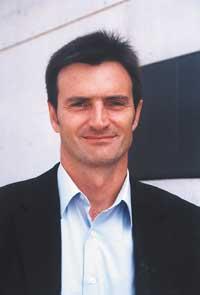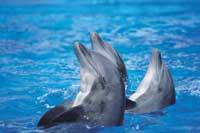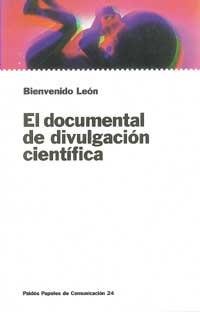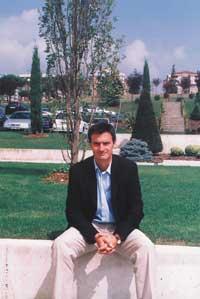Welcome Leon: "The key is in the ability to count things"
You have worked a lot on television. What do you have in your hands right now?

I am working with a new project, a script for a producer. I have done and work on nature, but in this case it is a work based on anthropology. We want to show rock paintings. Now I am researching and studying to be able to make the script.
So you're still doing professional journalism. Ten years ago, however, he paused, abandoned the media and went to teaching.
They offered me the opportunity, I liked the idea and I gave myself. However, I think in the background there is another reason. The journalistic work is very nice, fascinating, but it has a drawback: every day you have to start from zero.
At the end of a job, except experience, the next day you have nothing. This generates some frustration, while teaching is the accumulation of knowledge day by day, the accumulation to count and publish to others. We must not start from zero, but from a known reality, which grows day by day.
Have you always been in scientific disclosure?
No. The truth is that I started making documentaries not related to scientific, especially cultural, dissemination. Of course, all topics have a scientific basis. I remember, for example, a series of popular festivals in South America, based on culture, custom, etc. but also in the anthropological part.
And when did you decide to dedicate yourself to scientific dissemination? Why?
It was during the realization of the thesis. My thesis was actually referring to general documentaries, until I met the documentaries of David Attenborough. I realized I needed tools to explain it, some sort of magnifying glass to know why Attenborough documentaries were so successful. One of them was the scientific dissemination. I started researching and continued on that path.
It seems that more and more of scientific dissemination is being talked about and that science has a growing presence in the media. What situation do you think you are in?
It seems to me that interest is gaining. There is no doubt that more people are interested in scientific dissemination years ago. On television, for example, it has more and more space. Although the telesor, the reallity shows and the top show command, programs that look for the morbo, there is more and more space for scientific dissemination. On television there has never been as much science as today.

Recently I was talking to the person responsible for social issues in the news programmes of Televisión Española. He said that in the debates to decide the themes of Telediario it has never been so easy to introduce scientific topics. Science arouses interest. The polls reflect the interest of people, and as the media know it, they are also interested. This does not mean that there is still not a long way to go, especially with regard to the quality of this disclosure. We have a very long way, but within the media science is in very good condition.
The dissemination of science in the written media has a certain level, and it also has presence, it is entering the radios, the great presence of internet and web pages of all qualities, that I will not deny it, but it seems that it has not yet found the right place in the television.
The truth is that the world of television is very broad: there are many networks, there are many genres, there are documentaries… The truth is that the situation in Spain, together with other countries, is only regular; for example, compared to the BBC or others. But there are also good documentaries, good reports, especially when dealing with topics of nature, health and astrophysics. Of course, bad things are also done, but we are not so bad.
There may not be a complete science programme in local TVs, but in other sessions, such as in informational sessions, a couple of news stories about science or health are coming in each day. On Italian television, for example, they have been developing a program called Superquark for years. It has become an international benchmark and has a large audience. They bet for it in their day and with the passage of the years has managed to conquer the public. This does not exist in local television channels. There are networks, but it is not comparable, since it is a program that is broadcast in the early hours of the morning, so there are few people who see it.
To me the truth is that I do not worry that there are specialized programs. At one time there were also science sections in the newspapers. They all became ghettos. I think it's good that there is science in news, documentaries, magazines… it has to be on all sites and not in special programs.
Nature and Science, for example, are references in written media for the rest. Is there anything on the TV?

I will quote three: a series of the BBC Horizon, which began to be broadcast in the 60s, a weekly and high quality time. Another is the Nova program of the American TVS chain. If we look at the magazines, I would say the above Superquark program. There is more, but they are clear references.
And what do those programs have? Or what do not others have?
Well, the key to having a lot of time on television is not just how the program is done, but it's something that depends on the decisions of those who send in the channels. The leaders of the BBC in Britain in the 60s bet on science. Being a public television, it was decided that it was one of his tasks, apart from the number of spectators who were going to get the programs. And, in addition, they wanted to become a reference in the base of quality. They were surprised when they realized that people saw at ease this type of programs, which were interesting to the public, that in prime time could also compete with other networks. For example, David Attenborough's programs were able to compete with fiction programs. It is no coincidence. And by then the audience was already formed, this type of programs managed to combine the viewer, they put themselves in prime time, they moved a big budget…
“Documentaries are boring,” people say, well, there are boring, but there are others who are not. In most cases, boring documentaries have small means of production: a couple of interviews and two or three images accumulated abroad because there is no more money. That is not a documentary, it is a bad documentary. Nor can they be given more budget because they are delivered in low audience spaces… and while they are not in high audience bands, no means can be put for production, so the documentaries will be of low quality. A rope that does not end, as you see.
Aside from resources, what are the keys to making good documentaries?
Keys? First, I would mention the ability to count. How to tell people things? That is very difficult. Good professionals, good informers and good training are needed. A divulgator with little training will hardly count things well. Good writers are needed to collaborate with scientists. In short, people need to master communication techniques and work with scientists capable of explaining something that interests people.
And then, who has to disclose? Journalists? Scientists? Scriptwriters?…
I think there must be everything, scientists, journalists, filmmakers, scriptwriters… and the ideal would be one who has training on both sides, who knows well the communication techniques and at the same time some branch of science. In the nature section of the BBC, for example, they place people of scientific profile who direct the documentaries and surround them with communicators to form in the communication techniques. The reverse road is also given, but it is more complicated. In any case, the quality is given by teamwork, the training of excellent teams of scientists and journalists.
He has mentioned the nature section of the BBC. It seems that documentaries and reports that have a certain success in television refer to animals or nature. Does the rest of science fit on the TV?

It is more difficult, but there are good examples of biology, medicine or astrophysics, with a large audience. But not everything has to be sellable, not everything has to go on the TV.
Let's look at TV news programmes. In the world every day thousands of things happen, and in television a small percentage of all of them is drawn, because there are issues that by themselves attract the attention of the people. The same is true of science. We don't have to count everything, but what really interests people, and what we can count on in a nice way. It is very difficult to divulge some topics. This doesn't mean they don't have to be counted, but you may only have to tell some specific aspects of these issues, you have to find other ways. It is true, however, that nature has a great strength to attract people, because it is always different, unpredictable, because the images are spectacular… it is easier.
Visibility or scientific rigor?
You have to look for both. Visibility can be a hook, but if you stay in that you have only made the half way. Documentaries with spectacular images are like junk food, half an hour after eating, go hungry again because they do not contain substances.
On the other hand, documentaries cannot be filled with content. The experts say and I agree that documentaries cannot have much information. For this there are books, magazines, internet… If we try to give a lot of information, we will make a tired and boring session. The work must have its own rhythm, its locutions too, and the image must speak for itself. In a documentary you can not give many ideas because in the end the spectators do not stay with any. The objective of documentaries should be to obtain as broad a public as possible. That, in principle, is a great limitation, but also a great opportunity.
For example, the Planeta Azul series that have aired on ETB has had a large audience. The other day I read that if a scientist for a whole century gave a lecture in a large room and every day, I would not get to the number of spectators who have had a chapter of this series. This is surprising and one must take advantage of the opportunity, but knowing the limits of the medium and the forces of the medium. And among the latter, there is no need to give much information, because no one realizes anything. It must be taken into account that it reaches many people and that we must also address it in a pleasant way.
Can you live from this?
Some get it, but it's not easy. However, they will be more and more. I want to encourage people and among the students I have already started working. It costs. I tell you that scientific dissemination is still something new, which is growing, that there are few specialized people. This is an advantage, since there is little competition, but on the other hand, being new, few jobs are still generated. There is work in media, universities, museums, institutions dedicated to science… it is not a massive offer, but it is another way out.
In any case, whoever wants to start with it has the obligation to form well, both from a scientific and communication point of view. If you have to talk about nature, you have to know about biology; if you want to talk about stars, astrophysics…
Welcome Lion In fact it is from Soria, but since the age of 6 he lives in Pamplona. He studied journalism and, despite having spent a year on the radio at the end of his studies, most of his professional life has done it on television. He made 10 years in the production companies of Barcelona and Madrid. Together with other journalists he created the agency Editmedia TV, the first television agency in Spain. In 1992 he left the company and moved to T5 to coordinate the informative sessions. He spent a year in that work and came to the University of Navarra to structure and promote the Euroview production company of the university. He also carried out his doctoral thesis analyzing the documentaries of David Attenborough. He teaches at the University of Navarra, but at the same time he continues to carry out scientific outreach work for television, especially with subjects related to nature. |
Buletina
Bidali zure helbide elektronikoa eta jaso asteroko buletina zure sarrera-ontzian








